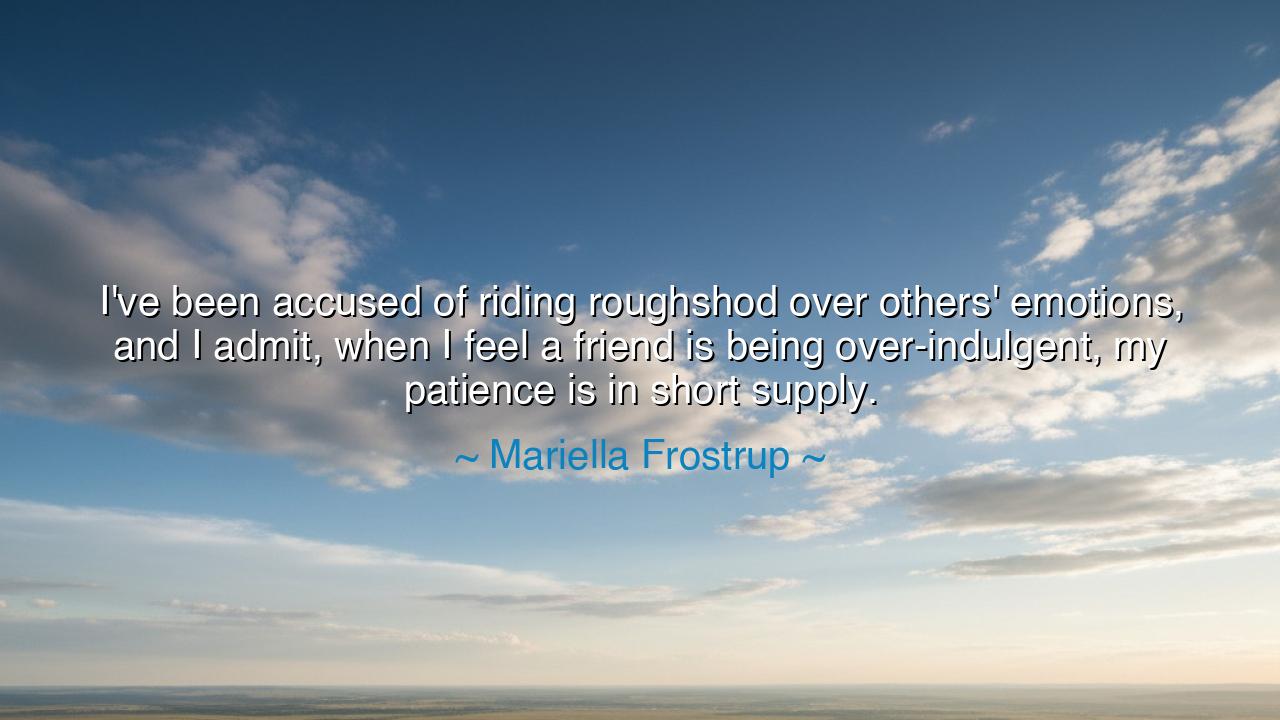
I've been accused of riding roughshod over others' emotions, and
I've been accused of riding roughshod over others' emotions, and I admit, when I feel a friend is being over-indulgent, my patience is in short supply.






Hear, O listeners, the candid words of Mariella Frostrup, who spoke without disguise: “I've been accused of riding roughshod over others' emotions, and I admit, when I feel a friend is being over-indulgent, my patience is in short supply.” This is not a boast but a confession, a mirror held to human nature itself. For within it lies the eternal tension between compassion and severity, between gentleness toward the weaknesses of others and the stern demand that they rise above indulgence.
To ride roughshod is to tread too heavily, to forget the delicacy of another’s heart. Frostrup acknowledges that her strength, when unchecked, can wound. Yet she also reveals the source: her impatience with indulgence. She cannot bear to see friends sink into self-pity or endless complaint, for to her, such surrender is a squandering of life’s brief and precious fire. Thus her words illuminate a paradox: her harshness is born not of cruelty, but of urgency, a belief that one must not wallow but rise.
Consider, O listener, the tale of Cato the Younger, the Roman statesman famed for his severity. He was revered for his incorruptible character, but also feared, for he showed little tolerance for weakness in others. When Rome descended into chaos, Cato’s stern voice called men to virtue, yet many found him cold, unyielding, even merciless. Like Frostrup, he walked the line between principle and patience, between truth-telling and tenderness. His life reminds us that the virtues of strength can easily turn to vices when compassion is neglected.
Yet there is wisdom in Frostrup’s admission. She does not hide her flaw; she names it. To confess impatience is the first step toward tempering it with balance. Her words remind us that even virtues—such as honesty, clarity, or discipline—can become sharp swords that cut too deep if wielded without gentleness. In this way, her confession is also a warning: the strong must learn to measure their strength, lest it wound those they seek to help.
And still, let us not despise her impatience. For history, too, shows us that at times a sharp rebuke awakens the slumbering soul. Recall the prophets of old, who thundered against the indulgences of kings and people alike. They did not whisper comfort; they cried aloud, demanding repentance and change. Their words bruised, but they also healed, for they stirred men to abandon their stupor and reclaim their purpose. Thus, Frostrup’s impatience is not without use: it is the spark that drives others away from complacency.
The lesson, then, is balance. We must carry both patience and truth, both tenderness and firmness. Too much patience may become enabling; too little may become cruelty. Too much severity may harden hearts; too little may leave them to decay in indulgence. The wise soul knows when to comfort and when to challenge, when to sit silently with a grieving friend and when to urge them forward with unyielding words.
Therefore, O seeker, take this teaching into your own life: do not be afraid to speak truth, even when it wounds, but speak it with love. Be patient with the fragile, but do not indulge endless self-destruction. Recognize, as Frostrup did, your own tendencies, and temper them with reflection. For the true friend is neither endlessly indulgent nor mercilessly harsh, but one who knows when to listen, when to endure, and when to call another to rise. In such balance lies the art of friendship, and in such art lies wisdom for all generations.






AAdministratorAdministrator
Welcome, honored guests. Please leave a comment, we will respond soon